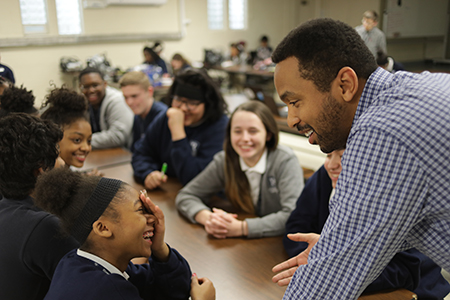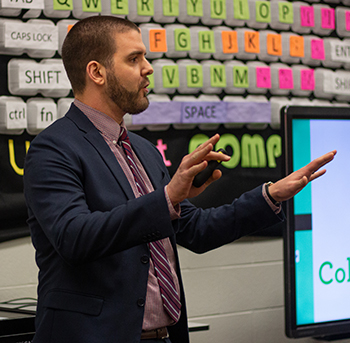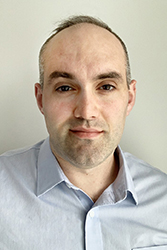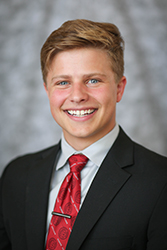Some educators find their calling early in life and know it’s in a classroom. Others know they want to make a difference and find their opportunity in the education field. Wabash alumni in the education field fall into both of these categories, and several of them can be found working for Indianapolis Public Schools, the state’s largest school district.
 Emanuel Harper ’10 was a real nerd when he was at Wabash—and those are his own words.The Indianapolis native fell in love with languages while he was a student at Lawrence North High School.
Emanuel Harper ’10 was a real nerd when he was at Wabash—and those are his own words.The Indianapolis native fell in love with languages while he was a student at Lawrence North High School.
Education was just transformative for me—particularly language classes,” he says. “I took French and Spanish, and it was a point of pride for me that I was just really good at them. I think it showed me the possibility of my own growth.”
Harper’s passion for languages continued at Wabash. He majored in French, minored in Spanish, and also took German and Greek along the way.
When I graduated, I thought I might go abroad and use my French in some capacity, but I loved being in the classroom. I had wonderful experiences in high school and college, and I wanted to replicate that for other students. In my heart, I knew the classroom was where I needed to be. So, I got my teaching license through Indianapolis Teaching Fellows, and I’ve never looked back.”
Harper began his career teaching French at George Washington High School, a large high school that is part of Indianapolis Public Schools (IPS). From there, he went to one of IPS’s innovation schools, Herron High School, a much smaller, charter school. He continued to teach French at Herron (while also serving as the school’s curriculum specialist and state testing coordinator) before transitioning to being the school’s dean of students.
In 2017, Harper was one of seven people who helped start Herron’s second campus, Riverside High School, where he serves as the assistant head of school.
“Each of my roles definitely had a steep learning curve and required me to do a lot of reading and to develop a lot of connections with people who knew more than me,” Harper says. “What I love about being the assistant head of school at Riverside is how much it connects me back to being a teacher.
“My role now is to primarily think about system-wide school culture—to think creatively about how to connect students with each other and create opportunities for self-discovery on a larger scale. That’s what I loved about teaching French. Languages give you so many opportunities to learn about yourself while also learning about different perspectives.
“Especially right now in a virtual environment. We want our students to know they are important to us,” Harper says. “Yes, grades are important, but so is community. So is being known and feeling loved. That’s what we want for our students.”
 Right around the corner from Riverside High School is Cold Spring School, another IPS innovation school, where Cody Stipes ’11 is the principal. Stipes came to Wabash with the goal of one day becoming a principal. “I know that sounds weird,” he says with a laugh, “How many times do you have 18-year-olds saying, ‘I want to be a principal?’ But that was what I wanted.”
Right around the corner from Riverside High School is Cold Spring School, another IPS innovation school, where Cody Stipes ’11 is the principal. Stipes came to Wabash with the goal of one day becoming a principal. “I know that sounds weird,” he says with a laugh, “How many times do you have 18-year-olds saying, ‘I want to be a principal?’ But that was what I wanted.”
Years before he became the leader of a K–8 school, Stipes was elected to lead Wabash as its student body president.
“I wanted to do good,” he says. “And I don’t mean I wanted to do the job well. I wanted to do good through and for Wabash. Like many freshmen, I had a really hard first semester. And I had a lot of help. Our Senate was fantastic! Together, we wanted to carry on the legacy of the Wabash m en before us and do what we could to make the College better.”
Stipes credits his experience as student body president for helping establish his leadership style today.
“I learned to listen first. Whether it’s as student body president or as a principal of a school, only when you truly hear what people are saying—really try to understand their concerns—can you make the best decision for your organization.”
His first Teach for America assignment was teaching eighth grade math at Tindley Accelerated Schools. After his time at Tindley, Stipes spent time working as an assistant principal for one of the IPS Center for Inquiry Schools. Now he’s in his third year as principal for Cold Spring, a magnet school that serves students in kindergarten through eighth grade.
It was his time teaching middle school that inspired him to make the switch to elementary. In just those two years, Stipes had many students come to him years behind grade level, and he decided he wanted to do whatever he could to change that for future students.
“I want to make sure students are prepared enough so they can have options. Sadly, that’s not the case for so many of our students. However, research shows that, if students are on track when they get to middle school, that will maximize their potential to get into college and then through college.”
Cold Spring sits on 39 acres of land on the Marian University campus. Before the pandemic, students at the STEM-focused school spent a lot of time outside, taking advantage of the school’s woods, streams, goats, and chickens.
Even though all of the educational options can be confusing for parents and families to understand— public, innovation, magnet, charter, etc.—Stipes believes the opportunities IPS provides position the district to become even more successful.
“I just don’t know of another place that has the opportunity to make an impact in students’ lives like we do here in Indianapolis,” he says. “We just need more talented people to come in and help us.”
 One of the people seeking out those talented teachers is Alex Moseman ’11.
One of the people seeking out those talented teachers is Alex Moseman ’11.
Like Stipes, Moseman is also a Teach for America alumnus. However, teaching was never in his plans.
“It’s kind of complicated for me,” he said. “I got into education because of the belief in what it means for our society and what it reflects about our priorities. I didn’t think I could work at a system level without ever having stood in front of kids in a classroom.”
Even though teaching wasn’t his end goal, Moseman knew he wanted to join TFA before he even came to Wabash.
In February 2007, the founder of Teach for America, Wendy Kopp, was a guest on The Colbert Report. Moseman was a senior in high school, and, after her segment, he immediately researched TFA and how he could become part of it.
Moseman came to Wabash on a fine arts scholarship and majored in political science with a specific interest in international relations and counterterrorism.
“It was the perfect setup to understand how to manage a middle school classroom,” Moseman says with a laugh. “You’re constantly trying to win a battle of hearts and minds while also kind of running your own improv show.”
At the end of his two years with TFA, he decided he was not a good fit for the classroom. However, Moseman left having an understanding of what it is like to work in a school and an understanding of who would be a good fit.
“I’m always self-conscious that I wasn’t a good enough teacher, but I gained a deep sense of responsibility to make sure as many kids as possible have access to really great teachers.”
After spending time in recruitment in Wabash’s Enrollment Office and at the national nonprofit Building Excellent Schools, Moseman was hired by IPS for teacher recruitment with a focus on increasing the diversity of teachers. He currently does something similar, but now he’s recruiting principals and administrators. He also works on creating strategic recruiting pipelines.
“My experience in Wabash’s Enrollment Office was one that was very much on-the-ground, pound-the-pavement, trying to figure out how to find a very specific type of person.
“It’s a very similar process when it comes to finding a great teacher. The biggest thing is definitely a passion for working with young people. But a great teacher is also patient. They need to be willing to work on a team and collaborate. They need to be coachable; they need to understand that they’re going to fail but be willing to get better.”
After being recruited to Wabash by Moseman, Jack Kellerman ’18 came thinking he would go straight to law school after graduation. Everything the former student body president did during his college career was with that goal in mind—even interning for several different attorneys.
But they all told him the same thing: Experience something different first. That’s when Moseman brought up the idea of Teach for America.
 “I grew up so quickly that first year,” Kellerman says. “When I look back on myself at Wabash, I know there were times I probably sounded so arrogant. I certainly never meant to, but teaching has been the best experience and also the most humbling experience.”
“I grew up so quickly that first year,” Kellerman says. “When I look back on myself at Wabash, I know there were times I probably sounded so arrogant. I certainly never meant to, but teaching has been the best experience and also the most humbling experience.”
Like Stipes, Kellerman’s TFA assignment placed him at Tindley Accelerated Schools, where he taught seventh grade math.
Before he began teaching, Kellerman said he would teach anything but math. But, after a math teacher quit on the first day of school, the principal approached him and asked if he would be willing to step in.
“I actually wanted to be an economics major at Wabash, but Calculus 101 is the reason I’m not,” he explains. “The math just didn’t click with me, and I struggled academically for the first time. I used to be embarrassed by this story, but now I share it with students who really want to give up.
“When the principal told me the students could use a stable math teacher, I asked myself, ‘Did I do Teach for America for me? Or did I do it for the students?’ So, I decided I would do my best to teach math.”
Kellerman credits his rhetoric major for developing his teaching style more than any math class.
“During my time with the Wabash Democracy and Public Discourse initiative, I saw that people learn so much better from each other, and the same is true in the classroom,” he says.
“I took zero education classes at Wabash, but when I saw how I could draw upon my rhetoric experience, that’s when I began to figure out how I wanted to run my classroom. Instead of telling a student, ‘Don’t lean back in your chair,’ I now say, ‘Why might it not be a good idea to lean back in your chair?’ All of a sudden it becomes a dialogue that leads to an understanding instead of just enforcing rules.”
Kellerman now teaches math at IPS’s Longfellow Middle School.“
The fulfillment and the excitement of a classroom was not something I was expecting,” he says. “After my time with TFA was done, I felt like there was a lot I could still do. Being in the classroom transformed me, and the students are what kept me.
“I always feel good leaving work because it doesn’t feel like work. This is a lifestyle, and one I’m so happy with. Working with young adults and helping them grow—there’s nothing in the world like it.”
It’s 3 a.m. on a chilly Tuesday in February. Zach Mulholland ’06 is driving the side roads of Indianapolis, checking on the status of the snowy streets.
As director of operations for IPS, Mulholland helps make the decision on whether the district should have school that day. Mulholland manages the district’s food service and transportation departments, works closely with the school police, and takes care of the legal work for the district’s real estate.
“It’s definitely not a nine-to-five gig,” he says with a laugh. “There are a lot of early mornings, a lot of long evenings, and a lot of fires to put out.”
Mulholland likens his position with IPS to being an offensive lineman on a football team.
“When kids show up to school, it’s the operations team’s responsibility to make sure the school is clean and warm, the food comes in on time, and the buses arrive on schedule and drop them off safely. When everything runs smoothly, you don’t notice us. And that’s how we like it.
“It’s my job to make everybody else’s job easier,” he explains. “We block potential problems so the quarterbacks—our teachers—can do what they need to do.”
After graduating from Wabash as a political science major, Mulholland attended Indiana University’s McKinney School of Law. His first job out of law school was with IE Public Policy Institute, where his work was mostly focused on education and workforce development, which allowed him to testify on education-related bills at the statehouse.
Even though he comes from a long line of teachers and professors, the experience with the IE Public Policy Institute gave him a new perspective on education—one that inspired him to run for state representative in 2012. Even though he didn’t win, the connections he made through that process led to his being offered a job as the administrator for the IPS school board.
“They wanted someone who could help them navigate the legal and policy work the board is responsible for,” Mulholland says. “They knew I was in the policy world, was an IPS grad, and a champion for the district’s work.”
Mulholland took on his new role as director of operations in the middle of the pandemic, so he hasn’t worked as much with the “nitty-gritty” side of operations, like analyzing fuel contracts and a building’s energy efficiency. Instead, he helped IPS figure out how to pay for devices for all of the system’s students, many of whom either don’t have reliable internet or don’t have internet access at all.
There were other challenges, too: In a typical school year, IPS tries to fit 55 students on one bus, but the CDC’s recommendation was 25 per bus. Then there was the issue of how to meet their students’ nutritional needs when they were not in school.“
Education is so much more than what happens in the classroom,” he says. “If we don’t provide a meal, there are children who might not eat that day. If we don’t provide transportation, there are children who might never get to participate in extracurricular activities or athletics.
“They might not ever see us, but every day when our team goes to work, we want IPS students to know they are loved, that there is a huge group of adults who believe in them and are dedicated to providing them everything they need to succeed.” It’s my job to make everybody’s else’s job easier. We block potential problems so the quarterbacks—our teachers—can do what they need to do.”